WHO provides timely response to flood-affected governorates in Yemen
Sana’a, 16 August 2022 – In urgent response to the needs of the communities affected by floods in Yemen, the World Health Organization (WHO) has provided emergency health and laboratory supplies, supported specialized trauma teams and joined field missions with national health authorities and other humanitarian partners.
Triggered by the heavy seasonal rains, extensive flooding has ravaged several governorates in Yemen since mid-July 2022. Tens of thousands of people have been affected so far, with more than 35 000 households impacted across 85 districts in 16 governorates, according to local authorities.
At least 77 people, including children, were killed in Al Bayda, Amran, Dhamar, Hajja, Ma’rib and Sana’a governorates. In addition, displacement sites and infrastructure – including water supply, public services, and private properties – were severely damaged.
WHO supported 4 specialized trauma teams and 6 on-duty ambulances on the ground, as well as set up 34 epidemiological early warning detection points in Ma’rib – one of the most affected governorates – where thousands of shelters for displaced families were destroyed. Additional essential emergency health supplies were also released to the rapid response and emergency medical teams in Hajjah, Al Mahaweet, and Raymah governorates.
Along with its constant monthly supply of 144 600 litres of fuel to 11 hospitals, WHO, jointly with the sub-national health cluster, had also prepared a comprehensive heavy rainfall and floods preparedness and response plan in Al Hodeidah governorate, provided the Central Public Health Laboratory with equipment, and trained 25 laboratory technicians on the microscopic diagnosis of malaria.
“The risk of water- and vector-borne diseases, including malaria, cholera and other communicable diseases is unfolding,” said Dr Adham Rashad, WHO Representative to Yemen. “With heavy rains expected to continue until the end of August 2022, we have scaled up our response to reach affected people and prevent any potential outbreak of these diseases.”
Additional cholera kits, IV fluids, rapid diagnostic tests for cholera, and supplementary modules of the interagency emergency health kit are under way. WHO continues to provide aid as the situation evolves.
For further information, please contact:
• Muneera Al-Mahdli, Emergency Communications Officer, WHO’s Regional Office for the Eastern Mediterranean,
• Kevin Cook, Communications Advisor, WHO-Yemen Office,
Protecting Yemeni children against measles and rubella
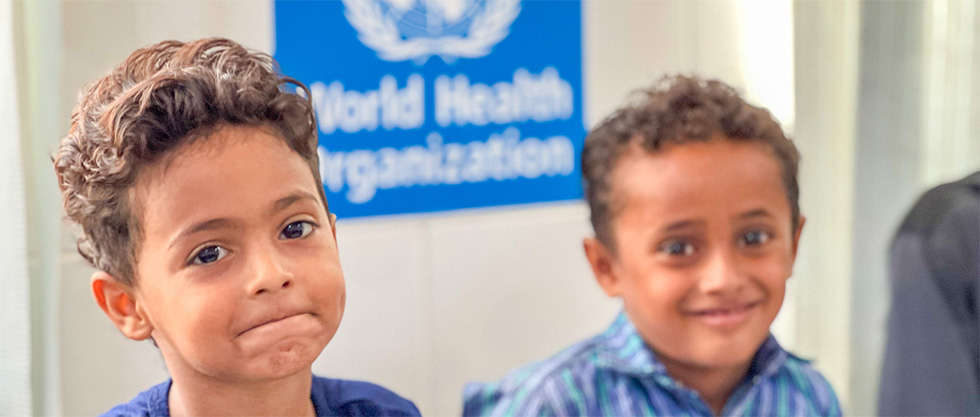
15 August 2022 - WHO together with public health authorities and partners is implementing a vaccination campaign against outbreaks of measles and rubella. The campaign aims to protect 1.35 million infants and children up to age 10, in 74 high-risk districts of 10 governorates across Southern Yemen.
Responding to Yemen's unseen mental health crisis
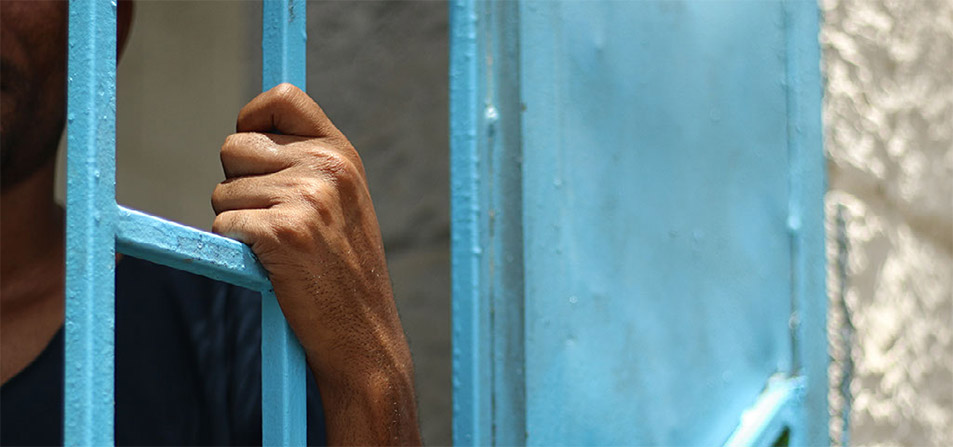
12 June 2022 - Mohamed (not his real name) is a 35-year-old patient at the Al Amal hospital in Sana’a – one of only four hospitals in Yemen providing care to persons with mental disorders.
Mohamed (not his real name) is a 35-year-old patient at the Al Amal hospital in Sana’a – one of only four hospitals in Yemen providing care to persons with mental disorders.
A father of four, Mohamed is isolated from his wife and children. He thinks about them constantly.
“They have nothing to eat,” he says, eyes welled with tears. “All I am worried about is my children going hungry, while I must stay here for my treatment. I miss them. They have no one to support them.”
Outside the hospital walls, Mohamed faces social stigma and shame, because of widespread misinformation, ignorance, and discriminatory attitudes about mental illness in Yemen.
Fighting COVID-19 and strengthening the backbone of pandemic preparedness and response
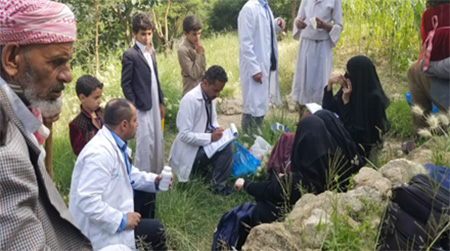 Sana’a, 2 June 2022 – Every country needs a strong health workforce to monitor and respond quickly to any increase in cases of infectious diseases. The world saw this clearly during the COVID-19 pandemic and it is a key lesson to take forward.
Sana’a, 2 June 2022 – Every country needs a strong health workforce to monitor and respond quickly to any increase in cases of infectious diseases. The world saw this clearly during the COVID-19 pandemic and it is a key lesson to take forward.
WHO and World Bank partnership on eIDEWS and rapid response teams
In Yemen, every year, cases of cholera, dengue, diphtheria, malaria, measles, and other diseases are reported. To support the authorities to rapidly detect and respond to these threats, WHO and the World Bank have worked together in partnership since 2017 through the Emergency Health and Nutrition Project (EHNP).
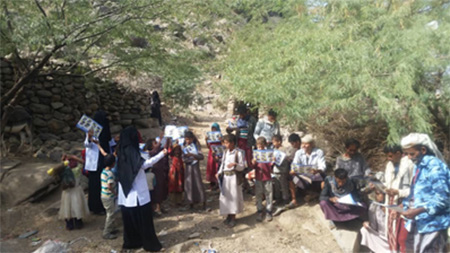 The WHO Representative to Yemen, Dr Adham Rashad Ismail Abdel-Moneim shared an example of the project’s success: “When the EHNP started there were around 1000 surveillance sites across 306 districts in Yemen. One year later the number of sites had doubled and expanded to all 333 districts in the country. By 2020, there were 2378 sites all regularly reporting via eIDEWS”.
The WHO Representative to Yemen, Dr Adham Rashad Ismail Abdel-Moneim shared an example of the project’s success: “When the EHNP started there were around 1000 surveillance sites across 306 districts in Yemen. One year later the number of sites had doubled and expanded to all 333 districts in the country. By 2020, there were 2378 sites all regularly reporting via eIDEWS”.
The EHNP also enabled significant upgrading of Yemen’s electronic Integrated Disease Early Warning System (eIDEWS). The platform is now completely digital and standardizes line lists, investigation forms and response forms as well as summarizing key information into visual dashboards.
Responding to the world’s largest cholera outbreak
During the largest cholera outbreak the world had ever seen, in Yemen in 2016–2017, rapid response teams (RRTs) were established in every district with the World Bank’s support. They were equipped with mobile phones and tablets to report through eIDEWS so that data from the field could be made available to decision-makers. The 333 RRTs were made up of five members: a doctor or medical assistant, health educator, surveillance officer, laboratory officer and district health officer. They were supported and supervised by 23 governorate teams and two central teams in Sana’a and Aden.
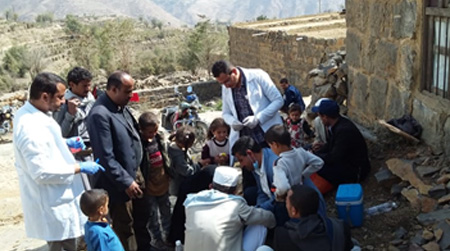 The RRTs played a critical role in containing the cholera outbreak and their value as first responders to infectious disease alerts was soon realized. Over time the remit of the RRTs expanded to cover more than 20 infectious diseases. Through the EHNP, almost 1800 RRT team members and 3000 surveillance officers have undergone training to build their skills and knowledge in disease surveillance and response. They are now an integral part of Yemen’s health system.
The RRTs played a critical role in containing the cholera outbreak and their value as first responders to infectious disease alerts was soon realized. Over time the remit of the RRTs expanded to cover more than 20 infectious diseases. Through the EHNP, almost 1800 RRT team members and 3000 surveillance officers have undergone training to build their skills and knowledge in disease surveillance and response. They are now an integral part of Yemen’s health system.
Tackling challenges together: COVID-19
When COVID-19 struck in 2020, the RRT model was used to quickly establish 670 COVID-19 teams. These two-person teams were deployed within 24 hours to investigate any alerts about suspected COVID-19 cases. They worked closely with the 333 RRTs who continued to monitor and respond to the myriad of infectious diseases in Yemen. This two-pronged approach of routine and COVID-19 specific RRTs enabled the surveillance system to be sustained even while COVID-19 dominated global attention.
The World Bank played a pivotal role by partnering with WHO on the Yemen COVID-19 Response Project (YCRP) in April 2020. The Bank was the first donor to support the COVID-19 response in Yemen, providing $27 million to WHO. These funds were crucial in activating the COVID-19 RRTs, establishing 48 isolation units across the country, dramatically scaling-up PCR testing to 18 laboratories, and procuring lifesaving supplies and equipment. In July 2021, the Bank again showed its leadership in pandemic response, providing an additional $20 million for Yemen to rollout the COVID-19 vaccines and reinforce health system capacities towards building back better.
Looking to the future: investing in human capital
Now as the focus on COVID-19 fades, Yemen is responding to outbreaks of polio, measles, and pertussis serving as constant reminders of the need to invest in routine immunization and preparedness and response. Eight years of conflict have taken a disastrous toll on the country, but by staying engaged the World Bank’s support to WHO has prevented the collapse of Yemen’s health system. Through the new Emergency Human Capital Project (EHCP), which is the successor to the EHNP, WHO and the World Bank are investing in building institutional and individual capacities.
Launching the intermediate Field Epidemiology Training Program (FETP)
One key activity of the EHCP, which builds on investments in eIDEWS, RRTs and the COVID-19 response, is a year-long intermediate Field Epidemiology Training Program (FETP).
FETP is renowned globally for building national epidemiological capacities. More than 80% of graduates continue to work in their home countries in leadership positions. In Sana’a, for example, the Director of Disease Surveillance and Response is a former FETP graduate.
This month 40 candidate health workers were selected from among hundreds across Yemen to compete for 25 places in the intermediate FETP course. They will build skills in public health data management and outbreak response, and they will do on-the-job field projects towards strengthening surveillance systems, all while continuing with their day jobs. At the launch of the course, the FETP Coordinator, Dr Yasser Ahmed Abdrehim Ghaleb stressed to the participants “in future, Yemen will count on you to rapidly investigate and respond to outbreaks.”








